
It was the mid 80s.
We had moved out of our first location in 1983. We ceased being Book Alcove of Frederick when I bought out my silent partner, Carl Sickles.
“You know you can’t use the name Book Alcove anymore,” he told me as we sat across from one another negotiating at the Barbara Fritchie diner just a couple hundreds yards west of the new store.
I’m sure we were having their homemade chicken noodle soup with their almost square half-inch noodles. We would always have that and a slice of one of their homemade pies. I usually went for the cherry.
I’d agreed to pay him for his share over the next few years. I’d call it the “Carl Loan.”
We had each put in $1000 in the summer of 1980. I don’t think he put any more cash in after that. He would give me books early on. He’d refer buys to me as well. In the beginning, it was a struggle to get books. No one knew who I was.
But he was like a father to me. His advice and mentoring guided me. In just a couple years, I’d grown the store substantially. He’d gotten his thousand dollars back, but there were never any “profits” to share. All the money got poured back into the business. More books, bookcases, floorspace… When I offered him $14,000, I think he was very pleased. At that price I wouldn’t feel guilty.
We shook hands and remained close friends and allies until he died on August 30th in 2005. 7 years after suffering a debilitating stroke.
I think it was when Carl started getting my monthly check that he began building bookcases in earnest. When I first started, we would only use a hammer and finishing nails to put the bookcases together. At least we had an electric circular saw. The backing would be a piece of Masonite or Lauan Paneling cut to size and nailed to the back of the bookcase frame. It took a lot of convincing to prove that a Makita cordless drill with a Philips Head bit and 1 1/2″ drywall screws were actually cheaper because of all the time that was saved. I recall he had also been reluctant to take the quantum leap from the steel moneybox and handwritten receipts to an electric cash register. I had bought mine in Carl’s Gaithersburg shopping center. The proprietor was a burly guy named Dutch. His business was the eponymous Dutch’s Cash Register Sales and Service. When Carl would visit my store, I would show off the machine that could track 10 different categories. At the end of the day, month, year…you would know exactly how many paperbacks you sold and how much they realized. At the end of each day you would push the Z button and “Z” out. Most of the day’s accounting would spill out on a foot and a half of cash register paper. Carl got the epiphany, and soon his cash box and receipt pads went the same way as mine.
Bookcases…
Carl was not terribly bookish and didn’t read much. He really liked the “work” and service aspects of being in business. His store (which is now Wonder Book Gaithersburg) grew organically starting in 1975. When he filled up one room, he would rent another and cut a doorway into the drywall. The store was (and is) essentially a rabbit warren of 10 repurposed offices and closets. For years he was constantly building bookcases for his store and his two sons’ stores. Then he ran out of places to expand into. His son, John, closed the ill-conceived Reston Town Center bookstore and took off to become a chiropractor. Ray, his other son, moved his store from Wheaton Plaza to Rockville Pike. There was no longer a need to build bookcases. I think Carl missed the carpentry and the sense of accomplishment when a bookcase was completed. So he rented another room—not contiguous with the store—and turned it into a workshop. He bought a big table saw and turned the nearby break room into a bookcase showroom. He hung out a shingle and began building bookcases assembly line fashion. He even produced a flyer.
That’s his wife Eleanor on the front.
He got busy enough that he hired a helper. Oddly, his name was also Chuck. That Chuck had been down on his luck. He had been homeless, sleeping in someone’s backyard when Carl took him under his wing. That was so like Carl—rescuing someone.
The hallways at Book Alcove became lined with stacks of #2 Pine planks. The acrid smell of Minwax wood stain often poured out of that room. The show room filled up with new styles, stain colors and configurations of bookcases.
He loved that kind of work and soon bookstores and book collectors were keeping him so busy that he started having a Mennonite guy up in Pennsylvania help keep up with the demand.
I have fond memories of my mentor with his carpenter’s apron on, his half-glasses perched on the end of his slightly long and pointy nose and sawdust in and around his hair island.
But now I was on my own. Well, I had been almost since the beginning.
I struggled to come up with a new name for the store. At first I decided on “Book Oasis.” We even had some pens made with that name and a palm tree and sickle moon.
But that didn’t seem to express my hopes and dreams, nor my philosophy about books. And it was kind of weird after I thought about it.
Buying out Carl coincided with moving the store from 1800 square feet at 1411 West Patrick to 1517 West Patrick with 3500 square feet.
It also coincided with my decision to get into the video rental business.
I loved movies. I wanted to start my own video rentals with movies “I” wanted to see. Things like Truffaut and Ingmar Bergman and Charlie Chaplin and Dr Strangelove…
Carl made it clear he had no interest in investing in a video store.
I’d picked out $7000 in videos from Schwartz Brothers Record and Tape Distributors for opening stock. They’d given me 60 days to pay. I knew pretty quickly I wasn’t going to make it.
I laid out the opening inventory in the living room at home on the Gettysburg farm. I prepped all the rentals. Was it 200 titles?
I put an ad in The Frederick News-Post.
Soon I was renting VHS videos like crazy.
Wonder Book became Wonder Book & Video, Inc.
Now I needed even more money.
I had a brilliant idea.
I cobbled together the First Annual Frederick Book, Card and Comic Auction. I dug out my own comic book collection. I stripped the store of anything remotely collectible. Baseball cards were extremely hot in those years. I dug out the cards I’d collected as a kid. Some things I had put aside for the future or a rainy day were put in.
This was the future. This WAS the rainy day.
I created a flyer. Put ads in The Frederick News-Post. I typed out a catalog on my old manual typewriter. I think there were about 300 lots.
There was a female “Singing Auctioneer” doing estate sales in the area. I hired her.
The auction was a success. After costs, I think I netted just about 7 grand.
But it was painful seeing all that stuff go so cheap. And it was a pain. All that prep work and advertising and set up. There were whiners and complainers…
The First Annual Frederick Book, Card and Comic Auction was also the last.
Auctions…
I’d been attending the monthly Waverly Book Auctions religiously almost from the beginning. It was a kind of bookselling seminar. Sitting in the audience, I could see the action, or lack thereof, on every lot. Things were selling to seasoned booksellers and collectors—live—in real time. With my catalog and pencil in hand, I would record the hammer price. Often exclamation marks would appear after if something sold far above or below estimate.
If something went low—REAL low—I might go after it. Especially if it was a group lot (i.e. Multiple books being sold for one price.) There was almost always room for money to be made on something in those multivolume groups.
I learned so much in that room.
After the auction, I’d go out to the Booey Monger restaurant with some of the other “Young Turks”—fellow young booksellers, and we would rehash results and talk about the “Big Guns” we’d observed in action—famous dealers and top collectors from New York, New Haven…
So now I was in debt to Carl. I was struggling to become a video mogul—spending more each month than I was taking in. I wasn’t even taking the $150 a week draw anymore. That had been the amount Carl and I had agreed upon when we’d started Book Alcove Frederick.
Then one day not long after I moved the store, bought out Carl and added the video business, I got the phone call.
“My name is Glen. I’m calling for my brother Teddy. He is deaf. Teddy and my other brother Isaac have been buying books for decades. Isaac succumbed to cancer last month. He’d been sick a long time. We have a storage unit full of books. Hundreds of boxes. We are up in Greencastle, Pennsylvania. Would you like to come look at them?”
At that time, I would go to EVERY call, regardless.
I quickly learned that hundreds often meant thousands. That thousands could mean hundreds. That “rare books” could be crap. That “my mom’s old books” might be a treasure.
So I drove west and then north across the Mason Dixon Line. Just a couple miles into Yankee territory, I found myself in a spartan living room in an old brick farmhouse. The parlor was tiny. Maybe 10×10. It was me and the two brothers.
Teddy was a very plain man. Angular. In his late 50s or early 60s. He worked as a school janitor. He wore a plain Perma Press white shirt buttoned to his neck. Black slacks with a simple black belt. White socks were visible as the cuffed trousers were a couple inches short. Plain black thick-soled shoes with black laces. He wore plain black plastic heavy framed glasses. His hair was razor cut short on the sides and maybe 3/4″ long on top.
He had been deaf all his life. When he spoke, the words were very thick and awkward. I studied hard to parse the sentence watching his lips and hands and eyes.
Glen would pitch in and help translate or explain.
The meeting then got complicated by the appearance of a sister, Sarah. She came down the narrow stairway and walked in on us. Sarah was dimwitted and flighty. She and Teddy lived together in the old farmhouse. She would flit into the room and make some wild random pronouncement, turn around, march out again. Five or ten or thirty minutes later she’d do the same thing.
Isaac had helped Teddy. Sarah was now Teddy’s burden. Because of his condition, at least he didn’t have to listen to her ravings.
But the story evolved in between interruptions.
For several decades, Isaac would take Teddy and go hunting for books on weekends. Two brothers, likely only one generation removed from a Mennonite heritage. Isaac would drive them to Washington or Baltimore and scout books. Or they would go to bookstalls, book barns or auctions in the region. Perhaps they were planning to open a store in retirement, but the vibe I got was this had been a hobby or avocation. Maybe it was more like a quest the two could pursue together.
Soon it became clear to me that this was a love story. Maybe akin to Of Mice and Men. (Which I consider one of the most beautiful love stories I’ve read.)
When Isaac died, Teddy was left bereft.
Teddy began quizzing me. I was being tested to see if I knew books; if I was worthy of their lifelong collection.
“What is O Henry’s real name?”
“Porter,” I over articulated the word so he could read my lips.
A big smile and a nod.
More questions. More and more…
More appearances by Sarah like some bizarre chorus member in an ancient Greek play.
I noticed an old oak barrister’s bookcase in the corner when I was trying to ignore one of Sarah’s flybys. It was one of the few pieces of furniture in the small parlor besides the three chairs we occupied. It was loaded with the Rivers of America Series. All were in pristine dust jackets. It seemed an odd contradiction to plainness and simplicity of the house, the yard, the furnishings, the remaining brother and wild-eyed Sarah.
After I’d apparently passed the interview, Glen told me we could go to the storage unit.
It was a simple affair. Teddy inserted a key into the twist handle on the metal garage door. The door rolled and rattled up into the dark ceiling inside.
I stood in the sun and looked into unlit space. Hundreds of uniform boxes filled the space from wall to wall; from floor to ceiling but for a narrow path along one wall.
Teddy stepped in and switched on the light—a simple bare bulb in the ceiling toward the back.
Maybe a quarter of the boxes were bagged. Large black plastic yard bags had been pulled over the big boxes. The open ends were cinched shut with wire twisted over the bunched ends.
“[The best books are in these.]” Teddy explained.
He untwisted the wire and slipped the bag off a box. He lifted the lid and lifted out the first book. It was wrapped in newspaper. He carefully unwrapped it and presented me with pristine copy of Pearl Buck’s The Good Earth. The jacket was bright and crisp. There were no nicks. He lifted the front cover and laid inside was 3×5″ thin slip of paper. The author, title and edition were written in pencil. (This was a first edition as were almost all their books.) Below that were some condition notes, the venue where the book was purchased and how much the brothers had paid. Below that was written: “Signed.”
Teddy opened the book to the title page, and there was a warm inscription from Buck to the previous owner.
Gone With the Wind (signed and inscribed), The Grapes of Wrath, For Whom the Bell Tolls…Twain, Hammett, Fitzgerald…
Box after box. Every book was perfect. The high spots were indeed almost always in the boxes in the plastic bags. The bags served to protect the best books from vermin or leaks. Every one of the better books was wrapped in newspaper. Every single box had a layer of newspaper in the bottom. I suppose to keep vermin out.
The boxes that weren’t bagged contained perfect copies of history, biography and fiction by second and lower tier authors. But most of the books were fiction.
We spent several hours looking through box after box.
Teddy would speak sometimes. I often didn’t understand what he was saying, but I got the essence. It was mostly reminiscence. Perhaps he was recalling the time and place and circumstances of the book he was holding. Maybe he was just talking to himself. Maybe sometimes he was talking to Isaac.
This had been a lifetime’s avocation.
Teddy couldn’t do anything with the books without Isaac.
We repacked everything. Carefully.
I had a box count.
And no idea what to do.
I drove back south into Maryland. My mind was working.
How could I do this?
I went back 3 more times.
There was no rhyme or reason to any box. No themes. Nineteenth century literature with cowboy history with business biography. But all in great shape. Most in jacket if it had been issued with one.
Every book had the thin slip of 3×5″. Almost every book was a first edition. Every book was perfect.
I took notes.
There was no internet; no looking to see how many copies of a book were out there and what the selling price range was.
I had bound copies of auction records and the few trustworthy price guides that were available then. I subscribed to the AB Bookmen’s Weekly and studied it diligently. (It was great bathroom reading.) I knew what sold in my shop. I was learning what sold at auction every month at Waverly. And I was doing two or three bookshows a year.
What in my wildest dreams could I pay for this collection?
This collection was one of my wildest dreams.
I went up one more time and saw Teddy and Glen.
“I can pay 25 thousand. It will take me years to sell, but I would very much like to work on this collection. I would need two years to pay.”
They asked me to step outside while they discussed things. I went out onto the wooden porch. It was painted white. Low rows of corn spread before me and into the distance.
‘Knee high by the Fourth of July,’ I thought.
After some time, they both came onto the porch.
Teddy said: “I want you to have them.”
He reached out, and I shook his hand. It was hard, calloused and very strong.
Glen had me draft an agreement. I used the local “two guys and truck” firm I’d used often to move all the boxes. I had to rent a drive-in storage unit to accommodate them. When all was done, my new space was filled—side to side and almost floor to ceiling. (I was able to clamber atop the solid block of boxes and crawl across my dragon’s hoard.)
Now I was in debt to Teddy as well as Carl. I also had a new monthly expense in the storage unit rent.
I began nibbling around the edges. I’d pop a box here and there. It soon became clear to me I was in over my head. Financially and strategically. I didn’t have the daily clientele for these kinds of things in what was then semi-rural Frederick, Maryland. At that time, I didn’t know any specialist well enough to work out consignment or other agreements.
I didn’t do and wasn’t much interested in mail order—especially of expensive books.
…Waverly Auction…
I took a few high spots down to Dale and Ruth. They were excited.
I was still reluctant. Auctions are risky for sellers. But I needed to generate cash—fast and for a long time.
It hurt to let some of them go. You’ve heard of buyer’s remorse. I had seller’s remorse. I doubted I would ever see such things again.
Fortunately, that was all happening near the beginning of the Modern First Edition boom (NOT the Hyper Modern Boom.) The books did great! They often set records for the highest prices achieved at auction. I would sit in the audience and cross my fingers that at least two bidders would really want the listing I’d circled in the auction catalog. My listings. When the auctioneer announced: “Sold!”, I would pencil in the price in the margin to right of the listing.
Of course, I continued to buy bargain lots to sell myself as well.
It all worked out well. Teddy and Carl were paid off on time.
When I could stop sending things to auction—I stopped. I never auctioned anything off again. Auctions made me sad for some reason. I wanted control of my books. I didn’t like selling with uncertainty and a “gun to my head.”
As more and more space opened in the storage unit, I was able to get in and spend some time opening boxes and withdrawing the colorful treasures. Always pristine. Always in dust jacket.
Whenever I popped a “Teddy” box, I’d almost always think of Teddy and Isaac spending their 1950s 1960s and 1970s finding fine books in fine condition on day trips all around the region.
Day trips to bookstores and estates from another time. World. Dimension.
As a cultural revolution built and peaked during those years, they lived and breathed the past. They captured time in boxes of pages and boards.
Brotherly love is a pure pursuit.
I thought of Isaac taking his brother out on field trips. Teddy couldn’t drive. Those were tough times for someone with a serious disability. Especially out in the middle of farm country.
Then I thought of Teddy, in turn nursing his brother through his long illness and decline.
And then I thought of Teddy after his brother and companion was gone. His life became far more quiet than just silent.
But he had his books. After Isaac was gone, I imagine he would go in the storage unit and open boxes and dream of those happy brotherly times. The thrill of the hunt. The exhilaration of discovery. His brother making at least some of his life pass by out in the mainstream.
When the movers had loaded the last of the boxes in Pennsylvania and headed south, I wrote Teddy the first check. I asked him about the Rivers of America collection back at the farmhouse. Would he like to let those go? I made an offer.
“No…” He shook his head. His eyes looked happy and sad at the same time if that is possible. He looked out over the cornfields across the street from the storage unit. They spread out to the horizon. But I felt he was looking even further. “No, I want to keep them.”
I understood his words perfectly.
For many years afterward, I kept many of the unbagged boxes unopened. They often contained perfect copies of obscure authors. They wouldn’t sell in the store. There wasn’t any demand for them at auction or bookshows.
I made what is usually the financial mistake of paying rent on boxes of books for a lot of years. But then I also used that space for new collections and staging. It wasn’t far from the store. It was much cheaper rent than the store per square foot.
When internet bookselling became viable, the time was right. Online selling was perfect for obscure things. Books whose customers were as rare as they were.
I wonder what year I finally unpacked the last of Isaac and Teddy’s books. Maybe it was in the early 2000s. I know there are a few around still. I just can’t put my hands on any right now. But I’d know one in a second. Each would have that thin 3×5″ slip of paper with information written in soft pencil by either brother.


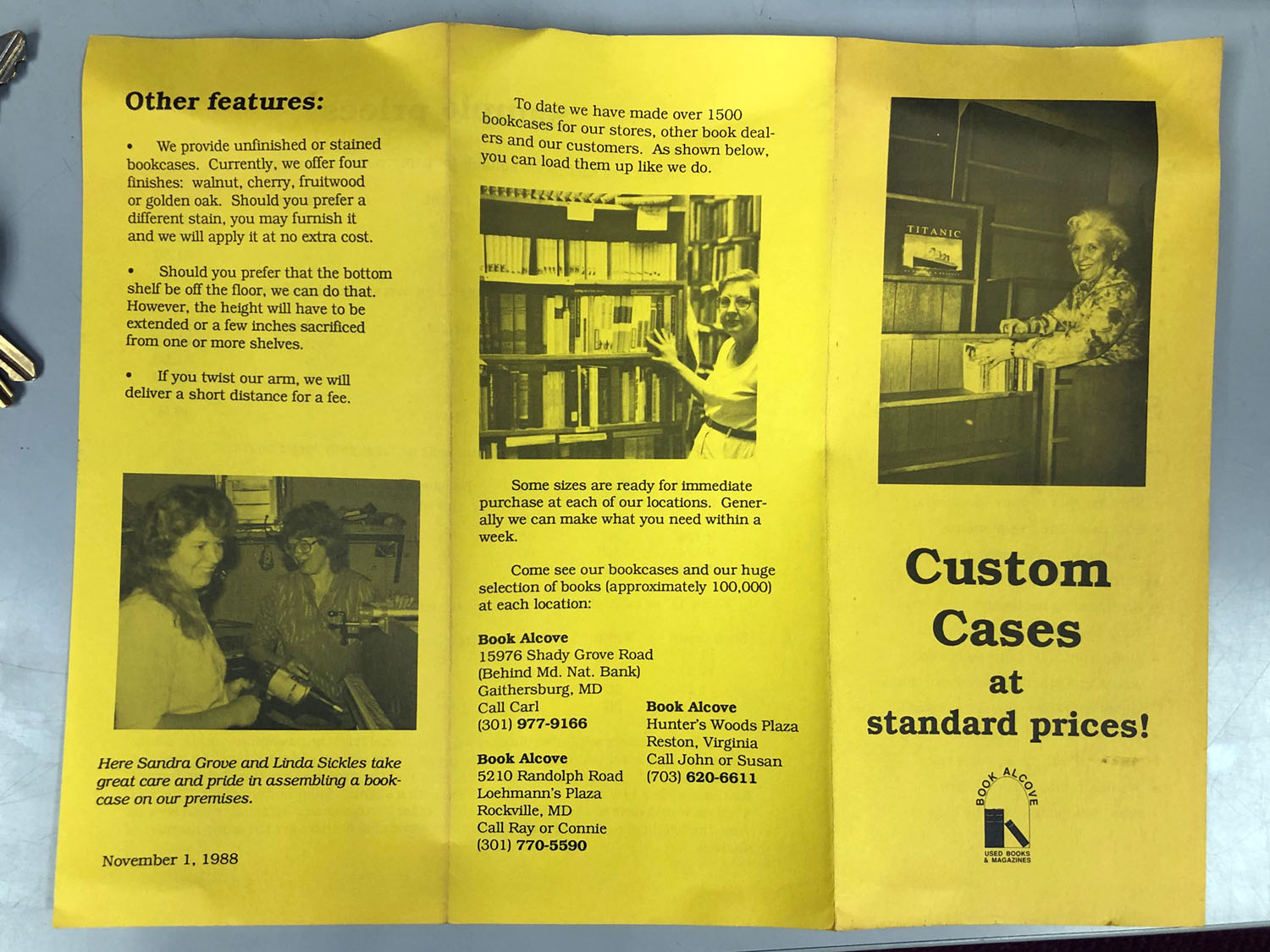
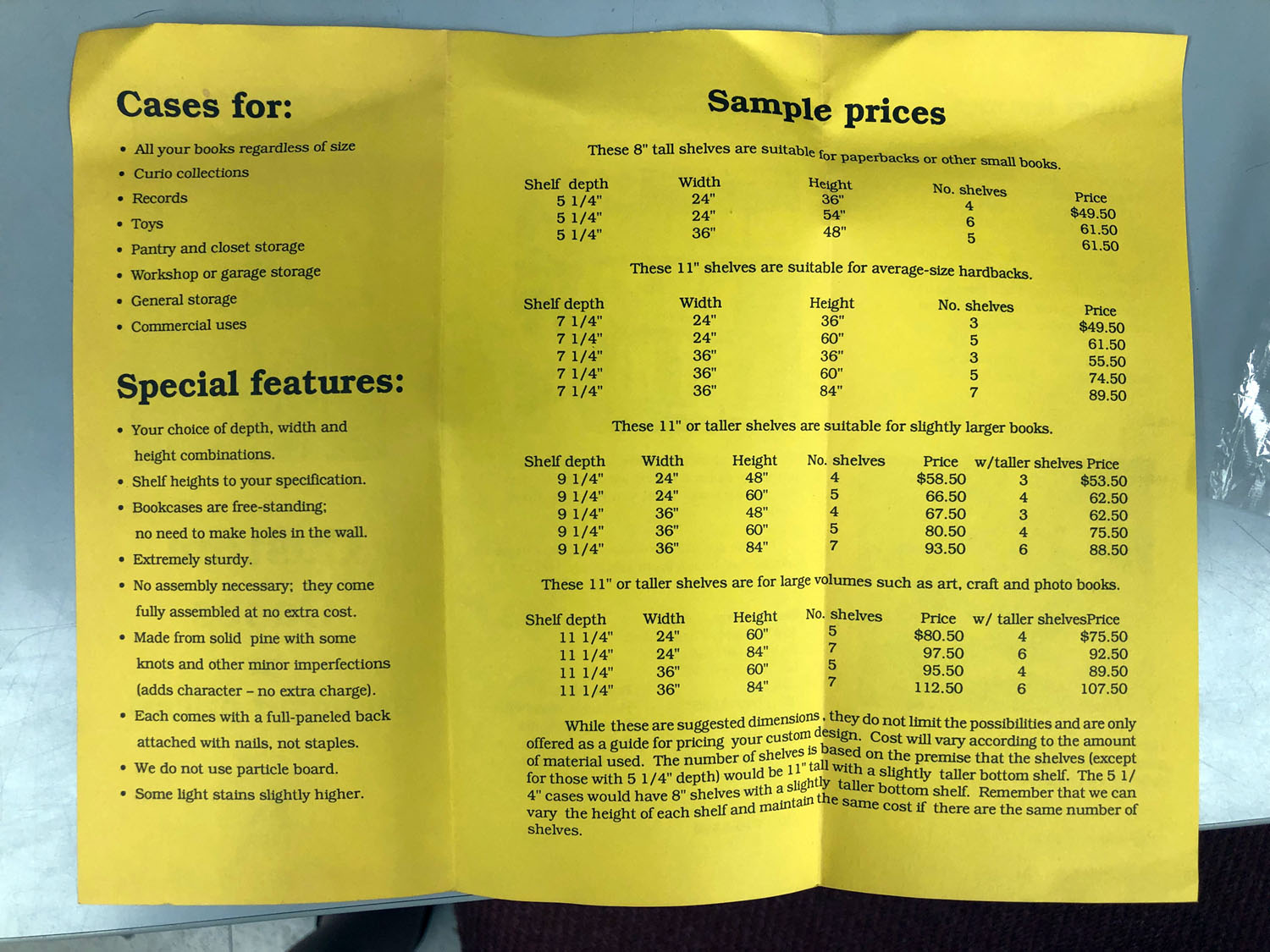
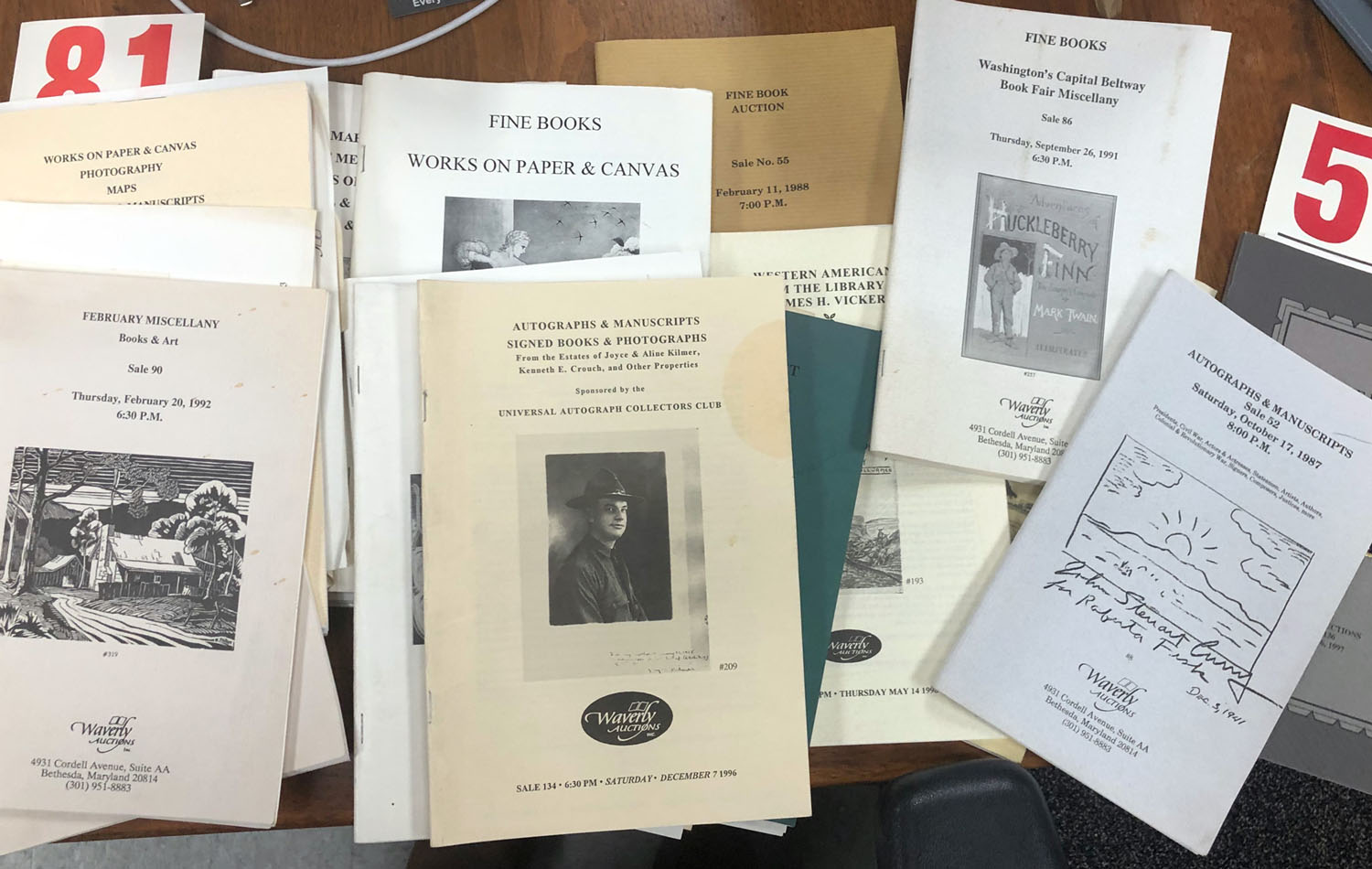
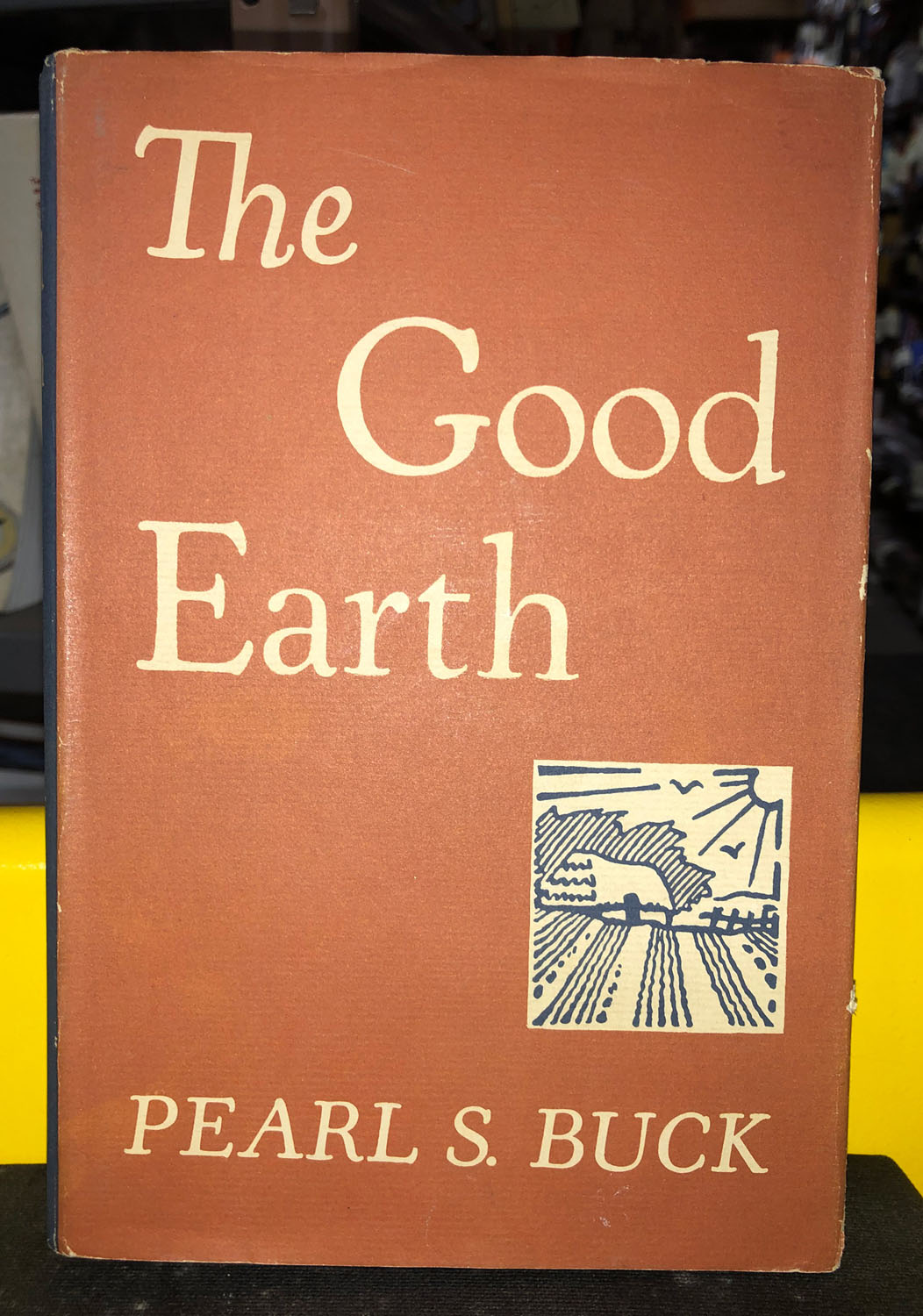
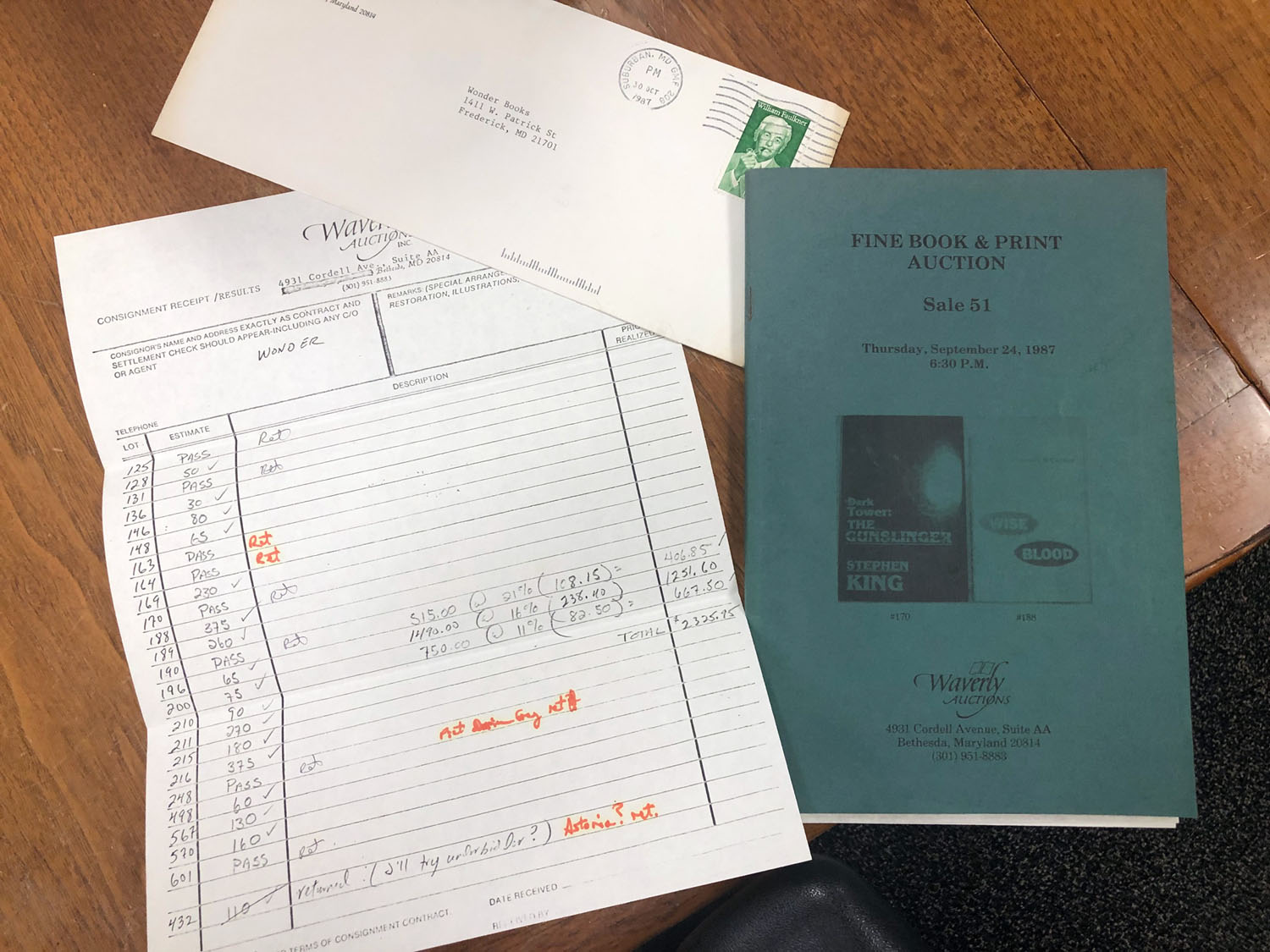
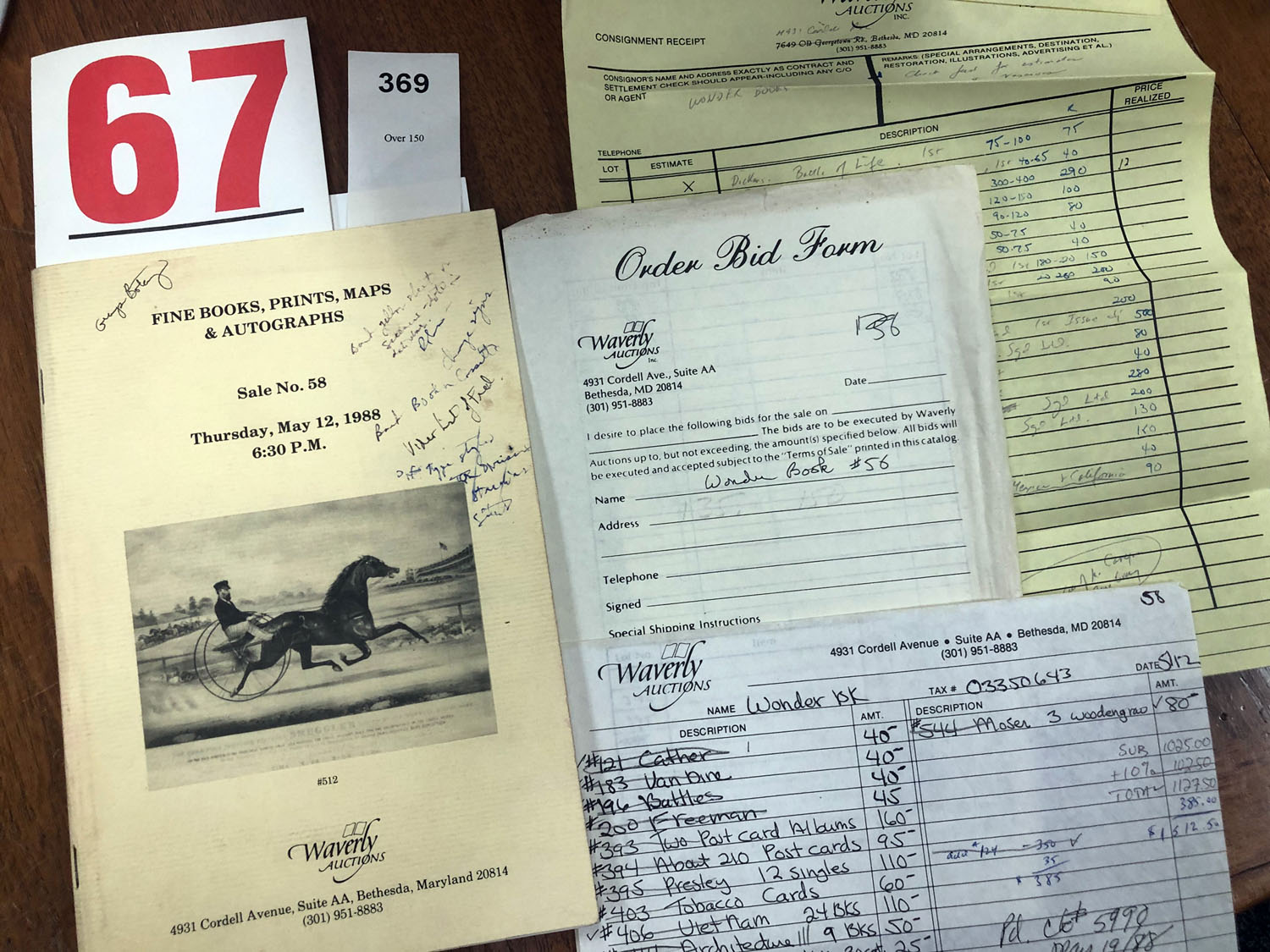
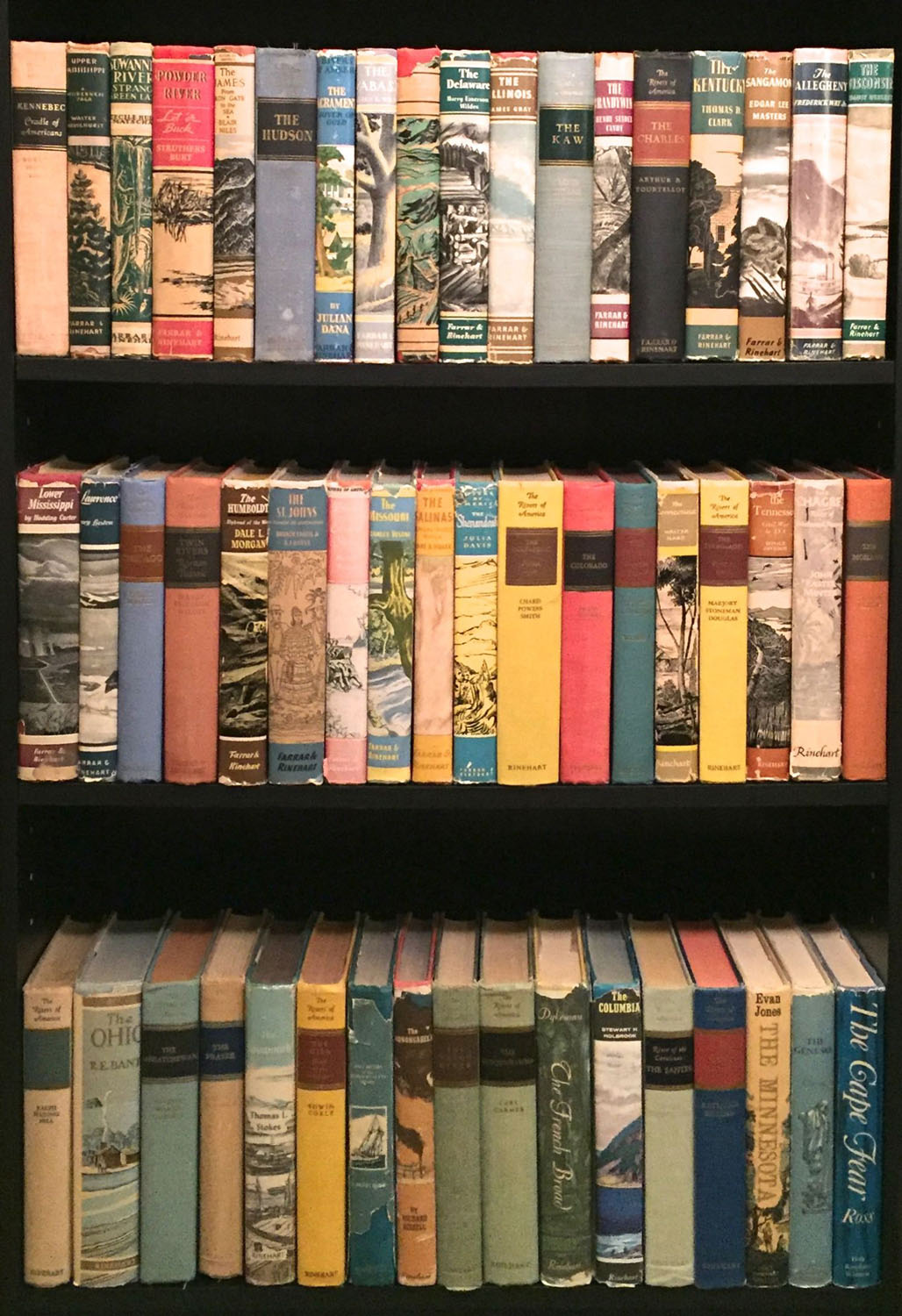
Chuck, this is one of your best entries yet. I only wish I knew someone who still made bookcases like Carl’s. We must have about 25 of them here in the house.
And talk about seller’s remorse: I once sold a first edition of W.E.B. Du Bois’s The Souls of Black Folk IN A FINE DUST JACKET——-for $750. That was 29 years ago, and I’ve since never seen another one come on the market.
Thank you Andy! That collection kind of established me – although most of the sales were “anonymous” – at auction.
There are a lot of books I regret having sold – but my tastes have changes and a signed GWTW wouldn’t do much for me personally anymore.
I have a friend contractor who builds bookcases for me.
I’ll email some pics. Not sure what he will charge but it doesn’t hurt to ask.
Thanks for commenting!
Chuck
Great story Chuck! Thanks for sharing these great memories
Thanks David.
It fun to think of some of these long ago events.
I appreciate the comment! Nice to know they’re being read.
Come visit
Chuck
A lovely story, simply & movingly told. Well done.
I was led to your blog by the article in Fine Books. This post happened to be the first to catch my eye, and so, it was the first I read. I look forward to reading many more. Many thanks for taking the time to do this.
Thank you so much for reading and commenting!
There are now well over 100 stories.
Most are “true” like the Brothers’ story.
We’ve posted at least one every Friday since 2017.
These came about because I wanted to capture as much of the used and collectible book experiences we have had in the last 40 years.
Best
Chuck